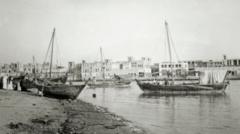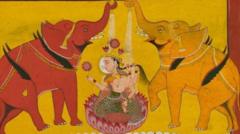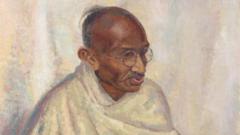This article delves into the little-known history of how a significant portion of the Arabian Peninsula was once administratively linked to British India and what could have happened if that connection had remained intact.
When Dubai Nearly Became India's Gateway to the Gulf

When Dubai Nearly Became India's Gateway to the Gulf
Exploring an alternative history where Dubai was connected to the Indian Empire.
In the winter of 1956, David Holden, a correspondent for The Times, found himself on the island of Bahrain, a British protectorate at the time. His assignment was unexpected; rather than focusing on local geography, he was attending a garden durbar celebrating Queen Victoria’s legacy as Empress of India. Holden's appreciation for the region’s ties to British India became evident during his visits to Dubai, Abu Dhabi, and Oman, where remnants of the Raj were quite visible. “The Raj maintains here a slightly phantasmal sway," he reflected, noting the presence of dhobis and chowkidars, as well as the familiar Anglo-Indian tradition of extravagant curry lunches on Sundays. The Sultan of Oman, with his education in Rajasthan, spoke Urdu fluently, and even soldiers of nearby states donned uniforms reminiscent of Hyderabadi army regalia.
Historically, portions of the Arabian Peninsula were governed as part of the British Indian Empire, with protection from India extending to territories like Aden, Kuwait, and beyond. Under the Interpretation Act of 1889, these protectorates were technically considered part of India. Indian passports were even issued as far west as Aden, which operated as India’s westernmost port, administered as part of Bombay Province. When Mahatma Gandhi visited the city in 1931, he was surprised to find many young Arabs identifying as Indian nationalists.
Ironically, the presence of the British Raj in the Gulf was largely concealed. Published maps showing the full extent of the Indian Empire were classified, and Arabian territories were deliberately omitted from public documents to avoid diplomatic strife with the Ottomans and later, the Saudis. However, by the 1920s, the political landscape began shifting. Indian nationalists envisioned a redefined India, not simply as an imperial power but as a culturally cohesive nation. The British saw a chance to redraw borders, leading to the separation of Aden from India on April 1, 1937. "Aden has been an integral part of British Indian administration for nearly 100 years. That political association will now be broken," read a telegram from King George VI, signaling that Aden would henceforth operate under the Colonial Empire.
Despite discussions between Gulf and British officials regarding the governance of the Persian Gulf after Indian independence, the reality was that officials in Delhi deemed the Gulf states insignificant. Dubai, along with others, was officially detached from Indian authority on April 1, 1947, just months prior to the division of the subcontinent into India and Pakistan. As Indian and Pakistani officials compiled lists for integrating princely states into their new nations, the Arabian Gulf states were entirely overlooked.
Years later, British Prime Minister Clement Attlee proposed a simultaneous withdrawal from Arabian territories similar to that from India, only to be met with resistance. Consequently, Britain maintained its influence in the Gulf for 24 more years, transitioning its oversight from the Viceroy of India to Whitehall, marking the last remnants of the Indian Empire.
The British finally withdrew from the Gulf in 1971, and as noted by Holden, it was a time when the territories "will be at liberty to seek their own salvation without the threat of British intervention." In the aftermath of British colonialism, Gulf states have successfully distanced their narratives from their historical connections to British India, fostering a sense of ancient sovereignty that supports current monarchies. Private memories, however, linger on, revealing a stark contrast to contemporary realities that reflect class dynamics as the Gulf countries transformed into affluent nations.
Today, Dubai stands as a vibrant global city, once a minor outpost of the Indian Empire. Little do millions of Indians and Pakistanis living there know that a bureaucratic decision in the waning days of an empire prevented their nations from integrating oil-rich Gulf states into their territories, leaving only echoes of a historical "what could have been."























